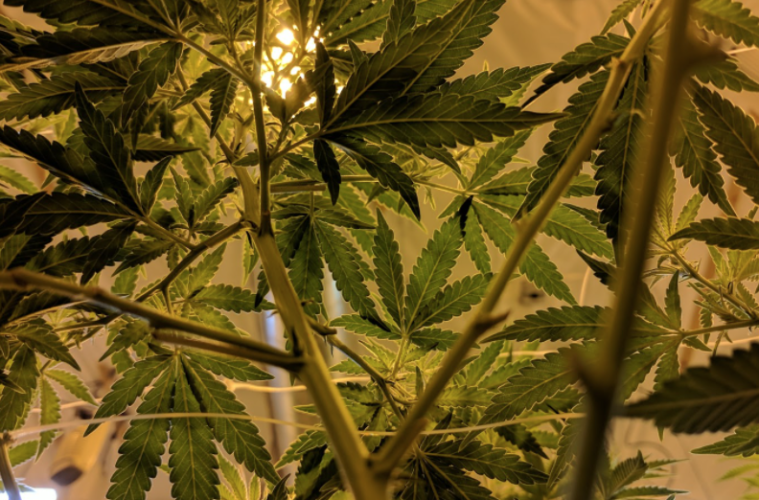When most people talk about THC, they have delta 9 THC in mind, which is the intoxicating compound in cannabis.
But this isn’t the only form of THC the cannabis plant makes.
In this guide, we’ll cover a newer, trendier cannabinoid — called delta 8 THC.
This psychoactive cousin of THC can be found in tinctures, distillates, gummies, and capsules. Learn all about it in this all-inclusive guide to delta 8 THC.
What is Delta 8 THC?
Delta 8 THC is short for delta-8-tetrahydrocannabinol.
It’s an analog of the THC molecule.
All forms of THC have a similar structure, but the way these atoms are arranged makes it different from delta 9 in a few key areas..
Delta 8 THC has recently garnered a lot of attention thanks to its use as a “legal high.” It has also received a colloquial name “diet weed” or “cannabis light” due to its milder psychoactive effects.
The potency of delta 8 THC is about half as strong as the high created by delta 9. It is also much less likely to trigger anxiety and paranoia — one of the main problems experienced by those who use high-THC strains.
The cannabinoid is available in many forms; similar to CBD and delta 9 THC, you can find delta 8 products in tinctures, vapes, capsules, and edibles. It’s also sold in raw concentrated forms.
The Potential Health Benefits of Delta 8 THC (Highlights):
- Reduces stress and anxiety
- Promotes healthy sleep
- May alleviate pain and lower inflammation
- Inhibits nausea and vomiting
- May elevate mood
- Offers neuroprotective benefits
- Stimulates appetite
- May be used as an adjunctive cancer treatment
What Does Delta 8 THC Feel Like?
Most people describe Delta 8 THC as a lightweight, more clear-headed, and less trippy version of delta 9 THC. The effects are much less pronounced and tend to manifest themselves on the body rather than the mind.
The exact effects of Delta 8 THC depend on the dose. Lower amounts (5–10 mg) are mildly energizing and help boost focus and productivity. This dosage range is also popular among those who take Delta 8 for anxiety and to improve stress response.
Higher doses (10–30 mg) can cause mild intoxication.
The high felt from delta 8 THC is often referred to as “without character” when taken on its own. You feel buzzed but in no particular direction. Most people who take Delta 8 THC consume it along with other cannabinoids, such as CBD or CBG, or they combine it with cannabis-derived terpenes to evoke some of the entourage effect. Another possible way to incorporate Delta 8 into your routine is to mix it with coffee or tea to boost focus, or with melatonin to improve sleep.
Summary of the Delta 8 THC Effects
- You may experience elevated mood and a sense of mild euphoria
- Time may feel like it’s moving slowly
- Your body feels relaxed and free from tension
- Lower doses induce a productive flow-state
- Higher doses can make you feel sedated
- Chronic pain becomes more manageable
- You feel a sense of peace and clearheadedness
Top Delta 8 THC Brands You Can Trust
1. Area 52: Most Reputable Company
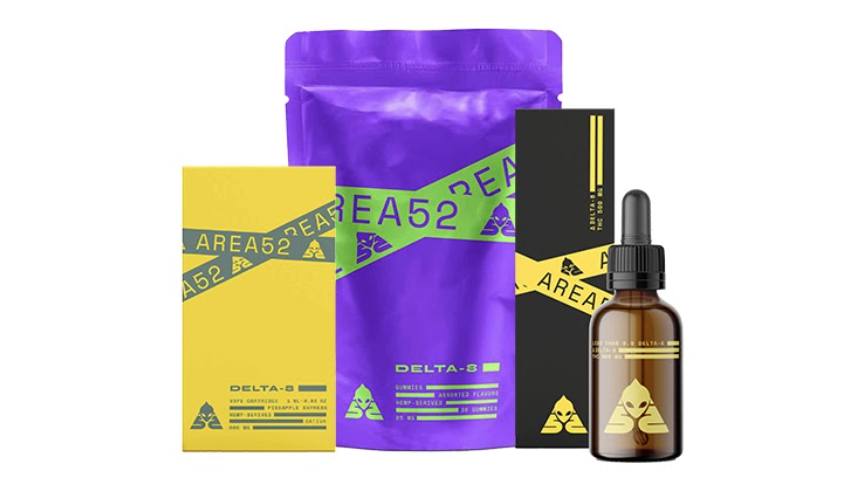
Area 52 specializes in delta 8 THC. The company’s mission is to provide plant extracts directed at the betterment of self — both physically and mentally.
These products are seriously top-notch. No corners have been cut in the extraction and isomerization of the delta 8 this company makes. They refuse to use any organic solvents, heavy metal reagents, or other harsh chemicals while making their D8 products.
They also make an effort to test every batch of delta 8 distillate that comes out of their facility. This is a key quality to look for in all delta 8 suppliers to avoid ordering underpowered or potentially harmful products.
2. Finest Labs: Runner-Up
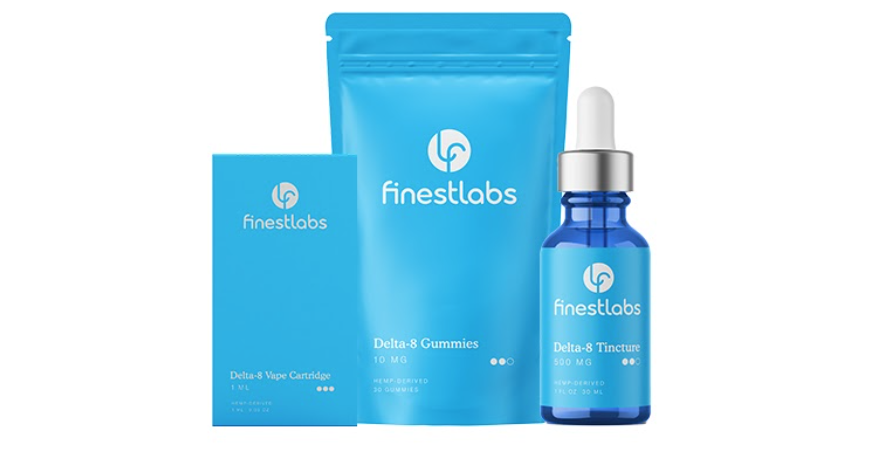
Finest Labs is a relatively new company in the delta 8 THC space but has already risen to prominence. They began as a manufacturer of cannabis terpene extracts but have since expanded their operation to include rare cannabinoids like delta 8 THC.
This company is backed by some of the best chemists in the cannabis space and is already well-known for providing exceptional cost to quality ratio for their delta 8 products.
Is Delta 8 THC Safe?
To date, no study has found cannabinoids to have any direct toxic effects on humans — and so is the case with delta 8 THC.
The main concern regarding this cannabinoid is its mildly intoxicating effects. Taking high doses of THC in any form may increase your risk of accidental harm due to motoric impairment. You should never drive a vehicle or operate any machinery that requires sobriety from the user.
Some studies have also found that delta 8 THC elevates blood pressure and heart rate; these effects, although acute, may make it unsafe for people with cardiovascular disease to consume — especially in the inhaled form.
You should abstain from taking delta 8 THC — or any form of THC — if you’re taking prescription medication for cholesterol. Other medications that may cause negative interactions with THC include barbiturates, benzodiazepines, blood thinners, diabetes medications, opioid drugs, and alcohol.
Potential Side Effects of Delta 8 THC
- Increased sensory perception
- Sedation or tiredness
- Elevated heart rate
- Trouble falling asleep (high doses)
- Anxiety and paranoia (very rare)
- Increased blood pressure
Is Delta 8 THC Legal?

Source: Shutterstock
Delta 8 THC is theoretically legal on the federal level under the 2018 Farm Bill. But in fact, it’s in a bit of a legal grey-area.
In other words, no federal agency has explicitly banned delta 8 THC — but there’s enough space for interpretation of its legality. It’s possible the DEA could take action against delta 8 THC manufacturers in the future.
Key Takeaways on the Legal Status of Delta 8 THC:
- Delta 9 THC is clearly listed as illegal according to the federal regulations. However, individual states have the right to regulate the cannabinoid on their own. Delta 9 THC is currently legal in 15 states for recreational use.
- Delta 8 is federally legal, but some states have banned delta 8 THC products.
- Delta 8 THC is usually extracted from hemp, which is legal in all 50 states as long as it contains 0.3% of THC or less.
- Hemp-derived products are legal in the United States.
- Delta 8 THC is made by converting trace amounts of Delta 9 THC in hemp.
- Synthetic extraction of THC is considered illegal — which may or may not affect delta 8 THC products that use chemical processes to convert delta 9 into its analog.
In 2018, President Trump signed the amended Farm Bill, which made a clear distinction between hemp and marijuana. Long story short, any plant with more than 0.3% of delta 9 THC per dry mass is considered as marijuana, whereas everything below that limit is categorized as hemp;
Any product made from Cannabis sativa plants that contain 0.3% of THC or less is legal in all 50 states.
On the other hand, products made from Cannabis sativa plants that produce more than 0.3% THC is considered a recreational drug. These products are federally illegal, although — as mentioned — some states have their own laws on delta 9 THC.
However, none of these regulations mentions delta 8 THC.
Technically speaking, any delta 8 THC products made from hemp plants are devoid of intoxicating properties and thus are federally legal. This works in the same way as the legal distinction between hemp-derived and marijuana-derived CBD.
That being said, some states have passed bills that have specifically prohibited delta 8 THC. At the time, you won’t buy delta 8 THC products in Alaska, Arizona, Arkansas, Colorado, Delaware, Idaho, Iowa, Mississippi, Montana, Pennsylvania, and Utah.
Delta 8 THC Dosage: How Much to Take
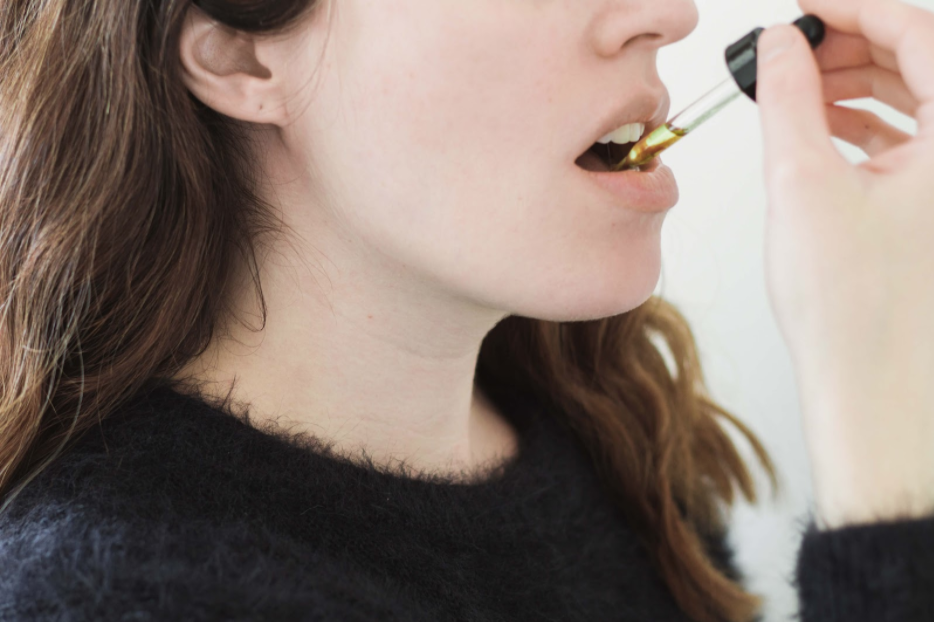
Source: Shutterstock
Delta 8 THC is considered roughly half as potent as Delta 9 THC. The regular psychoactive dose of delta 8 is estimated at between 5–30 mg at a time.
The overall dosage range for delta 8 THC is between 10 and 60 mg. Most people report a moderate psychoactive effect after using either 20, 25, or 30 mg doses.
Amounts between 1–5 mg are considered a good range for microdosing.
Factors affecting the strength of the dose include your weight, size, the expected intensity of effects, and your tolerance to delta 8 or delta 9 THC. The more often you take it, the more you’ll need to use at a time to achieve the desired effect.
Dosing THC for Specific Effects (By Weight)
| Weight | Mild Effects | Moderate Effects | Heavy Effects |
| 80 lbs (35 kg) | 5 mg | 10 mg | 20 mg |
| 100 lbs (45 kg) | 6.5 mg | 13 mg | 25 mg |
| 120 lbs (55 kg) | 7.5 mg | 15 mg | 30 mg |
| 140 lbs (65 kg) | 9 mg | 18 mg | 36 mg |
| 160 lbs (72 kg) | 10 mg | 20 mg | 40 mg |
| 180 lbs (82 kg) | 12 mg | 24 mg | 45 mg |
| 200 lbs (90 kg) | 13 mg | 26 mg | 50 mg |
| 220 lbs (100 kg) | 14 mg | 28 mg | 56 mg |
| 240 lbs (108 kg) | 15 mg | 30 mg | 60 mg |
| 260 lbs (118 kg) | 17 mg | 33 mg | 65 mg |
Can You Build Tolerance to Delta 8 THC?
Building tolerance to supplements and medications isn’t an uncommon concept. When you take a particular substance regularly, your body adapts to it, and thus you may need a higher dose to achieve the same effects over time.
The body can build tolerance to both delta 8 and delta 9 THC. This phenomenon, however, isn’t clear when it comes to cannabinoids such as CBD. With CBD, many users report reverse tolerance, meaning that less of the substance is needed to reap the benefits.
Studies have found that people build tolerance to delta 8 THC faster than they do to delta 9 THC. After using this cannabinoid for about one month, you can expect to need a higher dose to get the same results as before.
A good idea to curb your tolerance when it becomes too strong is to stop using delta 8 for a week or two, or at least limit its use for that period. Once you reach the second week of abstinence, any tolerance your body built to delta 8 THC should dissipate.
Delta 8 THC Products
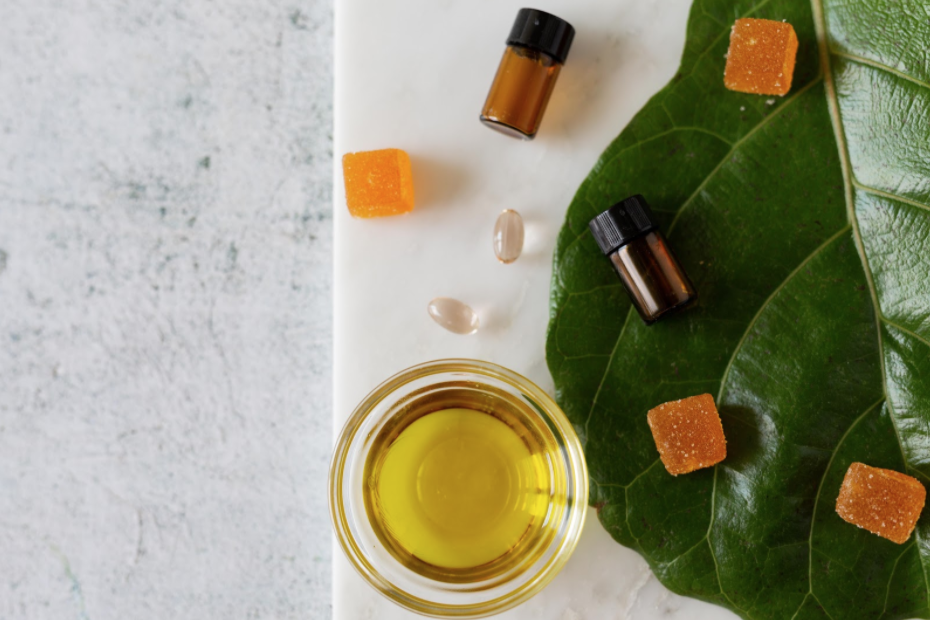
Source: Shutterstock
Researchers have been familiar with delta 8 since the 70s, but only recently, the cannabinoid has been put in the spotlight. As the social acceptance of cannabis grows, more people are starting to explore the health benefits of different cannabinoids.
Regular cannabis products — from strains that are high in delta 9 THC — aren’t suitable for everyone. Many people report side-effects like anxiety and paranoia after taking too strong a dose. These are the most common reasons some folks choose to avoid marijuana products.
The sudden surge in popularity has made delta 8 THC an object of interest for those who want to experience similar benefits without these negative reactions.
You can choose from many different types of delta 8 THC products today — it is available in all the same categories as other cannabis products. You can get extracts like tinctures or vape liquids, capsules, concentrates, or edibles like gummies.
1. Delta 8 THC Tinctures
Most people associate cannabis tinctures with CBD oil — the go-to extract for those seeking natural alternatives to manage anxiety, chronic pain, and sleep disturbances.
Delta 8 THC comes in the same convenient form as CBD tinctures. The advantages of this consumption method include dosage precision and more efficient absorption.
A tincture is made by first extracting the delta 8 THC from hemp and then infusing it into a carrier oil to distribute the compound evenly throughout the liquid. Delta 8 THC can be suspended in MCT oil, hemp seed oil, and olive oil.
Tinctures are simple and easy to use. You just measure out the desired amount of the oil and take it beneath your tongue or add to any beverage or food of your choice. Most people choose the sublingual administration because it helps them maximize the effects from a single dose by avoiding the first-pass metabolism in the liver.
Identifying the potency of your tincture is paramount for finding the right dose. Every tincture has a different amount of delta 8 THC in the bottle, ranging between 100–2000 mg of total D8. The bottle’s volume also affects the product’s strength.
To determine the potency of your delta 8 THC tincture, simply divide the total amount of the active compound by the volume of the bottle.
For example, a 1200 mg bottle contained in a 30 mL bottle translates into a potency of around 40 mg per mL. So for a 10 mg dose, you would need to take quarter of the dropper. For a 20 mg dose, take half of the dropper and so on.
2. Delta 8 THC Gummies
Edibles are another popular category of delta 8 THC products. The most popular edible format is gummies, just like with other cannabinoids. These sweet treats come with all different potencies and flavors. Delta 8 THC gummies usually contain between 10 mg and 40 mg of D8 per serving. Make sure you know the exact potency of your gummies to avoid accidentally taking too much.
3. Delta 8 THC Vapes
Vaporized THC provides the fastest onset of effects among all consumption methods. You can experience the effects after just a few hits, but they also disappear faster.
A Delta 8 THC vape is designed to heat the active compound — an e-liquid formula or concentrate — to a temperature high enough to release it, but low enough to prevent combustion.
Delta 8 THC vapes are available in the following forms:
- Delta 8 THC Cartridges – a vape cartridge is filled with an e-liquid formula. People attach cartridges to reusable vaporizers; they come in all different sizes, potencies, and flavors. Once emptied, you can unscrew the cartridge and throw it out.
- Delta 8 THC E-Liquids – an E-liquid is made from a blend of delta 8 THC distillate, vegetable glycerin, and propylene glycol. When these compounds are heated, they produce a thick white vapor. The experience is different from smoking concentrates because there’s no combustion.
- Delta 8 TH Vape Pens – disposable vape pens come prefilled with delta 8 THC distillate in a small pen-sized device. The liquid is inhaled through the mouthpiece; sensors will automatically detect your lips and turn on the heating element.
4. Delta 8 THC Concentrates
Unrefined delta 8 THC consists of a viscous, resinous, clear liquid. It is made by extracting THC from cannabis plants and chemically converting it into the delta 8 THC isomer. The conversion process leaves a bit to be desired, as the final extract usually contains up to 65% delta 8 THC and around 10% delta 8 THC. There’s also a small amount of CBD (around 5%) and trace amounts of other cannabinoids.
Some delta 8 concentrates then have their original terpenes reintroduced into the end product to thin down its consistency and leverage the entourage effect.
Delta 8 THC concentrates are the igniting point of the debate about the legality of this cannabinoid. In august 2020, the DEA issued a statement that clarified the way they look at some cannabis extracts — stating that synthetically extracted analogs of THC are considered illegal.
However, they didn’t specify what they mean by “synthetic extraction”. Some people interpret this as delta 8 concentrates, which require chemical conversion from delta 9 THC.
These products are relatively cost-efficient when you consider the cost per mg of the active compound.
What’s the Difference Between Delta 8 THC vs Delta 9 THC?
Delta 8 THC vs Delta 8 THC: Pros & Cons
| Pros | Cons |
|
|
Delta 8 is the analog of delta 9, meaning it has an almost identical molecular structure. When it comes to delta 8 vs. delta 9 THC, the difference is in the arrangement of atomic bonds.
For delta 8, the bond is at the 8th carbon chain, whereas delta 9 THC has this bond at the 9th chain.
This subtle difference is enough for the two cannabinoids to have slightly different properties.
Both compounds are the agonists of CB1 and CB2 endocannabinoid receptors (they activate them) to produce their effects. When delta 8 or delta 9 binds to the CB1 receptors in the brain, the resulting effect is the euphoric high experience when we consume marijuana products.
Delta 8 THC is about half as strong as delta 9 THC — meaning you need to use about twice as high a dose to get the same intensity of effects.
Despite being less potent, Delta 8 THC comes with a few advantages over its cousin. First of them is, of course, the legal status. As mentioned, D8 is federally legal despite being banned in some states. The side-effects are also less pronounced; it’s difficult to experience the same level of anxiety or paranoia after taking delta 8.
Delta 8 THC vs Delta 9 THC: Comparison Chart
| Delta 8 THC | Delta 9 THC | |
| Intoxication | Mild-Moderate | Moderate-High |
| Price | $$ | $ |
| Concentration in Cannabis | Less than 1% | Up to 30% |
| Receptors | CB1 & CB2 | CB1 & CB2 |
| Typical Dose | 10–40 mg | 5–20 mg |
| Effects on Appetite | Moderate Stimulant | Strong Stimulant |
| Potential to Trigger Anxiety | Unlikely | Very Likely |
| Legal Status | Legal-Grey Area (allowed in most states) | Illegal |
Where to Buy Delta 8 THC
The sudden hype on Delta 8 THC is driven by several factors. The main reason why people are making a transition from delta 9 THC to its delta 8 analog is the lack of the anxious side-effects associated with delta 9 THC. Delta 8 offers most of the same benefits when it comes to pain relief, sleep, and appetite stimulation — without causing any impairment or leading to paranoia.
If you’re considering trying this unique new cannabinoid first hand, the best way to start is researching on how to get delta 8 products locally near you, where you can read brand reviews and comparison. We provide unbiased insight into the best and the worst delta 8 brands in North America. We compare different products such as tinctures, vape carts, concentrates, and edibles — highlighting the best deals that get you the most bang for your buck.
For a quick recommendation, check out the Delta 8 extracts offered by Area 52. This premium company has some of the highest quality products we’ve seen to date. They are slightly less expensive than the competition, but the way they source the ingredients, and the purity of these products, are second to none.
Advertising disclosure: We may receive compensation for some of the links in our stories. Thank you for supporting LA Weekly and our advertisers.

